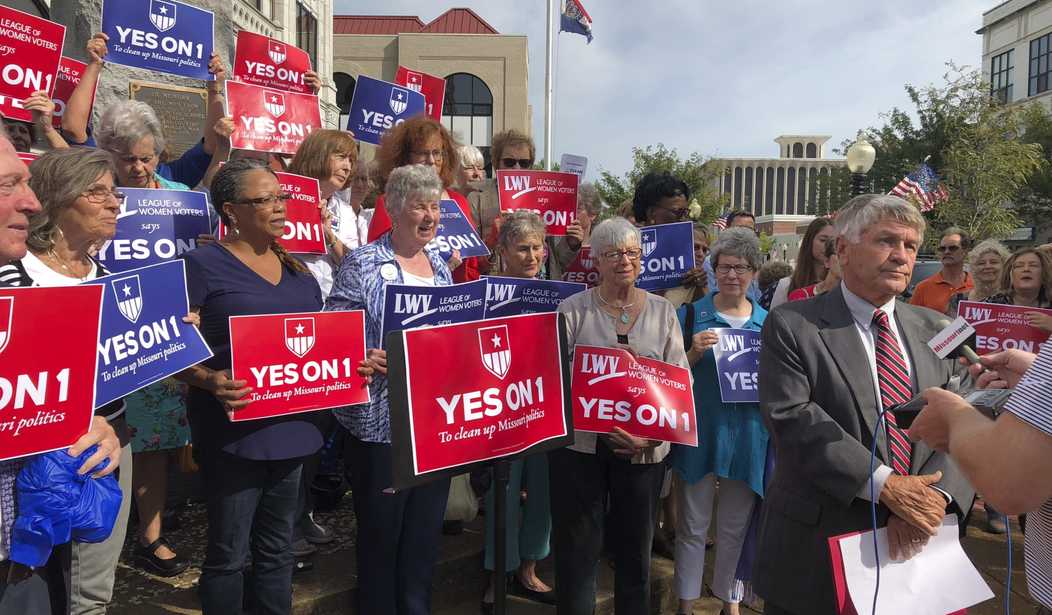Former Missouri state legislator Bob Johnson and Gwen Grant, president and CEO of the Urban League of Kansas City, warn that a “few powerful lobbyists and politicians are plotting to undermine the will of the people.”
In a Kansas City Star op-ed, Johnson and Grant called on the state’s General Assembly to resist the urge to change Amendment 1, a constitutional amendment that was approved by voters Nov. 6.
But those opposed to the state constitutional amendment that Johnson and Grant so vehemently support argue Missouri voters were actually duped by proponents of Amendment 1 and deserve a chance to change their minds.
As PJM reported before the November vote, Amendment 1’s opponents blasted the proposal as nothing but “voter candy.” And while they might have had no option but to concede defeat the morning after the November election, those who fought against the ballot proposition are not about to surrender and leave the field of battle.
Amendment 1was aimed at limiting the influence of big-money lobbyists, increasing the transparency of Missouri’s political process, and stopping what Johnson and Grant referred to as “Missouri’s broken redistricting system.”
But that isn’t to say the creation of Missouri’s legislative districts now is overtly partisan. A commission, divided between Republicans and Democrats, creates new boundaries following every election.
But as Matt Harris, a Park University political science professor, pointed out, while the current system isn’t weighted specifically toward the GOP or the Democratic Party, it is “very protectionist of the incumbents and drew a lot of safe seats.”
The amendment approved by voters, known as “Clean Missouri,” takes the authority to draw legislative districts away from a bipartisan commission and gives it to a demographer. That person, who would be selected by the state auditor, would draft new districts based on competitiveness and fairness.
No one has an exact idea of what these new boundaries would look like, but both sides of the Amendment 1 debate think the new map will lead to more districts leaning toward the Democratic Party.
“We took power away from special interests and gave it to the people,” Johnson and Grant added. “Amendment 1 is a first step to focus on what the people want instead of letting powerful lobbyists, big money and extreme partisanship drive the agenda in Jefferson City.”
It was a sweeping victory. Grant and Johnson said more Missourians voted for Amendment 1 than any other candidate or proposal on the midterm ballot.
State Senate President Pro Tem Dave Schatz (R) said the redistrict provision of Amendment 1 is a “major concern” to the legislature’s GOP majority.
It isn’t just Schatz and his fellow Republicans who are worried about the new legislative districts. St. Louis Public Radio reported some African-American Democrats are afraid the new boundaries could mean there will be fewer black lawmakers in Jefferson City.
District boundaries won’t change until 2021. So between now and then, opponents will try to persuade the legislature to alter or even repeal Amendment 1.
The Missouri GOP has already sent a check for $150,000 to the new political action committee, Fair Missouri, a group established to “reform Missouri redistricting” in November 2020 and undo what would be done by Clean Missouri.
Tony Messenger, a St. Louis Post-Dispatch columnist, called the formation of Fair Missouri “an absurd insult to Missouri voters.”
Eddie Greim, an attorney for Fair Missouri, told Kansas City’s Fox 4 that voters were fooled by Amendment 1, which he said doesn’t even guarantee that districts would be physically connected.
“We’re going to have elongated districts that try to mix Democrats living in the middle of cities with Republicans living out in rural areas. You have to do that to satisfy their mathematical formula,” Greim said.
But no matter if voters were duped or not, because Clean Missouri is a constitutional amendment the Missouri Legislature can’t change Amendment 1 without going back to those voters.
Republican Sen. Caleb Rowden, who was recently elected Senate majority leader, said he would talk to his GOP caucus and find out if there is broad support for going back to Missouri voters with a new “revamped redistricting proposal.”
The new proposal, Rowden added, “could include taking out requirements for ‘partisan fairness’ laid out in the (Clean Missouri) initiative.”
“My assumption is we could take a look at finding a way to make it more reasonable. I think the language in it is probably not constitutional and probably even able to be done in a way that it is trying to do,” Rowden told St. Louis Public Radio. “If we can make it better, let’s make it better.”
Senate Minority Leader Gina Walsh said not all of her fellow Democrats were united behind Amendment 1. But she added that one of her priorities going into the 2019 session would be to “hold to the will of the people.”
“I think the Legislature should not go against what the folks tell us to do,” Walsh added. “When people speak, we need to listen to what they say.”
Richard von Glahn with Jobs for Justice tweeted a warning to those who might be thinking of about asking voters to change the Clean Missouri amendment.
“A repeal would mean an awful lot of legislators voting against their constituents,” said von Glahn on Twitter. “Probably not a good strategy if you want voters to trust you.”









Join the conversation as a VIP Member